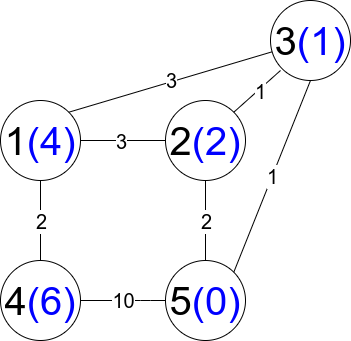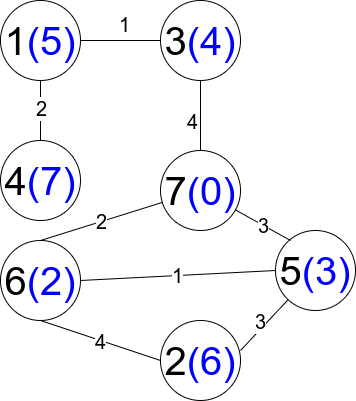Welcome to Subscribe On Youtube
Formatted question description: https://leetcode.ca/all/1786.html
1786. Number of Restricted Paths From First to Last Node
Level
Medium
Description
There is an undirected weighted connected graph. You are given a positive integer n which denotes that the graph has n nodes labeled from 1 to n, and an array edges where each edges[i] = [u_i, v_i, weight_i] denotes that there is an edge between nodes u_i and v_i with weight equal to weight_i.
A path from node start to node end is a sequence of nodes [z_0, z_1, z_2, ..., z_k] such that z_0 = start and z_k = end and there is an edge between z_i and z_(i+1) where 0 <= i <= k-1.
The distance of a path is the sum of the weights on the edges of the path. Let distanceToLastNode(x) denote the shortest distance of a path between node n and node x. A restricted path is a path that also satisfies that distanceToLastNode(z_i) > distanceToLastNode(z_(i+1)) where 0 <= i <= k-1.
Return the number of restricted paths from node 1 to node n. Since that number may be too large, return it modulo 10^9 + 7.
Example 1:

Input: n = 5, edges = [[1,2,3],[1,3,3],[2,3,1],[1,4,2],[5,2,2],[3,5,1],[5,4,10]]
Output: 3
Explanation: Each circle contains the node number in black and its distanceToLastNode value in blue. The three restricted paths are:
1) 1 –> 2 –> 5
2) 1 –> 2 –> 3 –> 5
3) 1 –> 3 –> 5
Example 2:

Input: n = 7, edges = [[1,3,1],[4,1,2],[7,3,4],[2,5,3],[5,6,1],[6,7,2],[7,5,3],[2,6,4]]
Output: 1
Explanation: Each circle contains the node number in black and its distanceToLastNode value in blue. The only restricted path is 1 –> 3 –> 7.
Constraints:
1 <= n <= 2 * 10^4n - 1 <= edges.length <= 4 * 10^4edges[i].length == 31 <= u_i, v_i <= nu_i != v_i1 <= weight_i <= 10^5- There is at most one edge between any two nodes.
- There is at least one path between any two nodes.
Solution
Use a hash map to store each node’s adjacent nodes and the corresponding weights. Then use Dijkstra’s algorithm to find the shortest path from node n to each node. Finally, use dynamic programming to find the number of restricted paths that start from node 1 and end at node n.
-
class Solution { static final int MODULO = 1000000007; int restrictedPaths = 0; int n = 0; int[] dp; public int countRestrictedPaths(int n, int[][] edges) { this.n = n; Map<Integer, List<int[]>> map = new HashMap<Integer, List<int[]>>(); for (int[] edge : edges) { int u = edge[0], v = edge[1], weight = edge[2]; List<int[]> list1 = map.getOrDefault(u, new ArrayList<int[]>()); List<int[]> list2 = map.getOrDefault(v, new ArrayList<int[]>()); list1.add(new int[]{v, weight}); list2.add(new int[]{u, weight}); map.put(u, list1); map.put(v, list2); } int[] distances = getShortestDistances(n, map); dp = new int[n + 1]; dp[n] = 1; return backtrack(distances, map, 1); } public int[] getShortestDistances(int n, Map<Integer, List<int[]>> map) { int[] distances = new int[n + 1]; Arrays.fill(distances, Integer.MAX_VALUE); distances[n] = 0; PriorityQueue<Integer> priorityQueue = new PriorityQueue<Integer>(new Comparator<Integer>() { public int compare(Integer node1, Integer node2) { return distances[node1] - distances[node2]; } }); priorityQueue.offer(n); while (!priorityQueue.isEmpty()) { int node = priorityQueue.poll(); int distance = distances[node]; List<int[]> list = map.getOrDefault(node, new ArrayList<int[]>()); for (int[] next : list) { int nextNode = next[0], weight = next[1]; if (distance + weight < distances[nextNode]) { distances[nextNode] = distance + weight; priorityQueue.offer(nextNode); } } } return distances; } public int backtrack(int[] distances, Map<Integer, List<int[]>> map, int node) { if (dp[node] == 0) { int curDistance = distances[node]; List<int[]> list = map.getOrDefault(node, new ArrayList<int[]>()); for (int[] next : list) { int nextNode = next[0]; if (distances[nextNode] < curDistance) { int nextCount = backtrack(distances, map, nextNode); dp[node] = (dp[node] + nextCount) % MODULO; } } } return dp[node]; } } ############ class Solution { private static final int INF = Integer.MAX_VALUE; private static final int MOD = (int) 1e9 + 7; private List<int[]>[] g; private int[] dist; private int[] f; private int n; public int countRestrictedPaths(int n, int[][] edges) { this.n = n; g = new List[n + 1]; for (int i = 0; i < g.length; ++i) { g[i] = new ArrayList<>(); } for (int[] e : edges) { int u = e[0], v = e[1], w = e[2]; g[u].add(new int[] {v, w}); g[v].add(new int[] {u, w}); } PriorityQueue<int[]> q = new PriorityQueue<>((a, b) -> a[0] - b[0]); q.offer(new int[] {0, n}); dist = new int[n + 1]; f = new int[n + 1]; Arrays.fill(dist, INF); Arrays.fill(f, -1); dist[n] = 0; while (!q.isEmpty()) { int[] p = q.poll(); int u = p[1]; for (int[] ne : g[u]) { int v = ne[0], w = ne[1]; if (dist[v] > dist[u] + w) { dist[v] = dist[u] + w; q.offer(new int[] {dist[v], v}); } } } return dfs(1); } private int dfs(int i) { if (f[i] != -1) { return f[i]; } if (i == n) { return 1; } int ans = 0; for (int[] ne : g[i]) { int j = ne[0]; if (dist[i] > dist[j]) { ans = (ans + dfs(j)) % MOD; } } f[i] = ans; return ans; } } -
// OJ: https://leetcode.com/problems/number-of-restricted-paths-from-first-to-last-node/ // Time: O(ElogE) // Space: O(E) class Solution { typedef pair<int, int> PII; public: int countRestrictedPaths(int n, vector<vector<int>>& E) { long mod = 1e9 + 7; vector<vector<PII>> G(n); for (auto &e : E) { int u = e[0] - 1, v = e[1] - 1, w = e[2]; G[u].emplace_back(v, w); G[v].emplace_back(u, w); } priority_queue<PII, vector<PII>, greater<PII>> pq; vector<long> dist(n, INT_MAX), cnt(n, 0); dist[n - 1] = 0; cnt[n - 1] = 1; pq.emplace(0, n - 1); while (pq.size()) { auto [cost, u] = pq.top(); pq.pop(); if (cost > dist[u]) continue; for (auto &[v, w] : G[u]) { if (dist[v] > cost + w) { dist[v] = cost + w; pq.emplace(dist[v], v); } if (cost > dist[v]) cnt[u] = (cnt[u] + cnt[v]) % mod; } } return cnt[0]; } }; -
class Solution: def countRestrictedPaths(self, n: int, edges: List[List[int]]) -> int: @cache def dfs(i): if i == n: return 1 ans = 0 for j, _ in g[i]: if dist[i] > dist[j]: ans = (ans + dfs(j)) % mod return ans g = defaultdict(list) for u, v, w in edges: g[u].append((v, w)) g[v].append((u, w)) q = [(0, n)] dist = [inf] * (n + 1) dist[n] = 0 mod = 10**9 + 7 while q: _, u = heappop(q) for v, w in g[u]: if dist[v] > dist[u] + w: dist[v] = dist[u] + w heappush(q, (dist[v], v)) return dfs(1) -
const inf = math.MaxInt32 const mod = 1e9 + 7 type pair struct { first int second int } var _ heap.Interface = (*pairs)(nil) type pairs []pair func (a pairs) Len() int { return len(a) } func (a pairs) Less(i int, j int) bool { return a[i].first < a[j].first || a[i].first == a[j].first && a[i].second < a[j].second } func (a pairs) Swap(i int, j int) { a[i], a[j] = a[j], a[i] } func (a *pairs) Push(x interface{}) { *a = append(*a, x.(pair)) } func (a *pairs) Pop() interface{} { l := len(*a); t := (*a)[l-1]; *a = (*a)[:l-1]; return t } func countRestrictedPaths(n int, edges [][]int) int { g := make([]pairs, n+1) for _, e := range edges { u, v, w := e[0], e[1], e[2] g[u] = append(g[u], pair{v, w}) g[v] = append(g[v], pair{u, w}) } dist := make([]int, n+1) f := make([]int, n+1) for i := range dist { dist[i] = inf f[i] = -1 } dist[n] = 0 h := make(pairs, 0) heap.Push(&h, pair{0, n}) for len(h) > 0 { u := heap.Pop(&h).(pair).second for _, ne := range g[u] { v, w := ne.first, ne.second if dist[v] > dist[u]+w { dist[v] = dist[u] + w heap.Push(&h, pair{dist[v], v}) } } } var dfs func(int) int dfs = func(i int) int { if f[i] != -1 { return f[i] } if i == n { return 1 } ans := 0 for _, ne := range g[i] { j := ne.first if dist[i] > dist[j] { ans = (ans + dfs(j)) % mod } } f[i] = ans return ans } return dfs(1) }